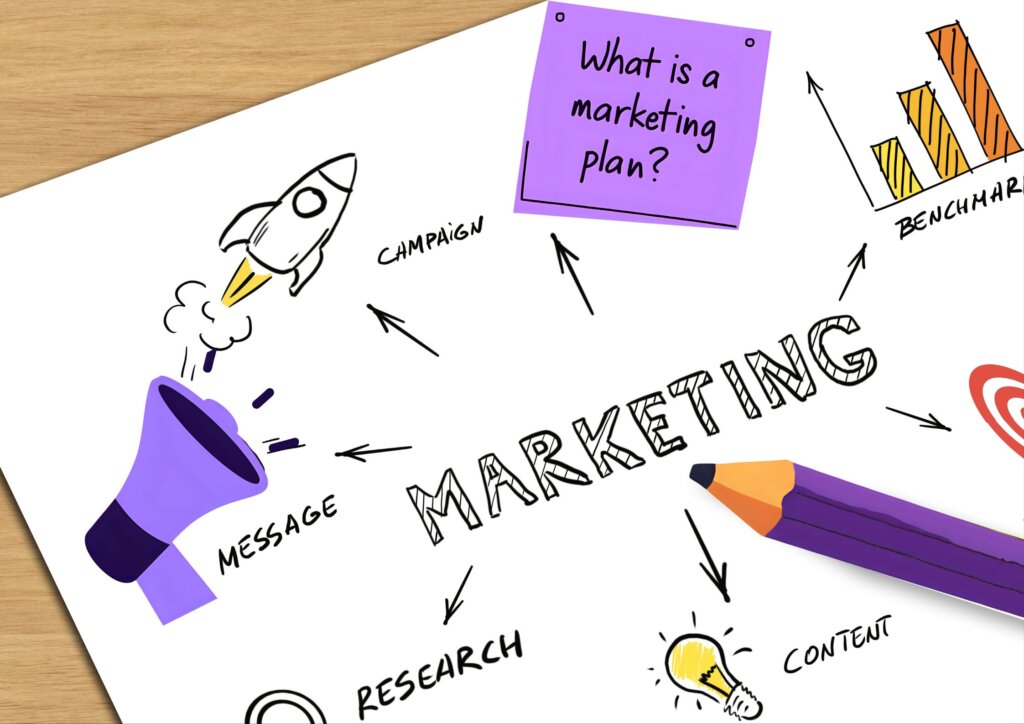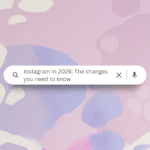Have you ever wondered what a marketing plan is? Does all the talk of marketing planning sometimes sound like double Dutch?
The truth is, a marketing plan is not as complicated as it might seem. In simple terms, it’s a road map for your business. Just like a GPS gives you directions on a journey, a marketing plan guides the actions your business will take to reach customers, promote your products or services, and achieve your goals.
Today, marketing plans also guide how your business shows up online — across websites, social media, search engines, and even in AI-generated results. With digital and generative search shaping how customers discover information, your marketing plan now helps ensure your business is visible, relevant, and credible in every channel.
Why a Marketing Plan Matters
A marketing plan sits alongside your business plan. While your business plan explains where you want to go, your marketing plan explains how you will get there. Together, they form a powerful combination that keeps your business focused and on track.
Without a marketing plan, businesses often end up wasting time and money on scattered activities that don’t produce results. With a plan in place, you’re more likely to:
Stay clear about your goals.
Target the right customers.
Use your budget effectively.
Measure progress and adjust when needed.
Modern marketing plans also help you make data-driven decisions. With tools like Google Analytics 4, social insights, and CRM reporting, you can track customer behaviour, campaign performance, and ROI more accurately. This allows for smarter adjustments in real time, rather than relying on guesswork.
What to Include in a Marketing Plan
So, how do you actually write a marketing plan? Here are some of the key steps:
Define your vision, mission, and values – what does your business stand for and where is it headed?
Today, many businesses also include their sustainability principles, brand purpose, and approach to responsible AI or data use — these shape how modern audiences connect with your brand.Set clear objectives – make your goals specific and time-bound so you can measure success.
Alongside traditional sales or awareness goals, include measurable digital objectives such as website conversions, engagement rates, lead quality, or customer retention. This ensures your goals align with both in-person and online growth.List your products or services – be clear about what you’re selling.
For many businesses, this now includes digital offerings; from online consultations and subscriptions to downloadable resources or e-commerce products.Identify your customers and consumers – sometimes the buyer and end-user are different, and it’s important to know both.
Today’s customer journey often spans multiple touchpoints – social media, search, websites, and even chat platforms. Using digital insights such as audience analytics or customer personas can help you target the right people with the right message at the right time.Research your competitors – who are you up against, and what makes you stand out? This is your positioning.
Competitor research now includes online visibility; how well competitors perform in search rankings, reviews, and social engagement. Tools like SEMrush or Google Search Console can help you understand where your business fits in the digital landscape.Develop your pricing strategy – how will you price your products and why?
Consider how your pricing is reflected online, including delivery fees, digital bundles, or membership tiers. Transparent pricing builds trust and supports better conversion rates.Plan your sales process – what channels will you use to sell, and what support will you need?
Alongside in-person or phone sales, think about digital channels such as your website, social media shops, email marketing, and paid advertising. Integration across these platforms helps create a seamless customer experience.Decide how you will promote your offering – consider signage, brochures, advertising, promotions, and social media.
Promotion today also includes search engine optimisation (SEO) and Generative Engine Optimisation (GEO) — ensuring your business appears in both traditional search results and AI-generated answers.
A good mix of owned (website, email, blog), earned (PR, reviews), and paid (Google Ads, social ads) channels will help you reach audiences effectively. Don’t forget video marketing, local SEO (Google Business Profile), and customer advocacy through testimonials and user-generated content.Set your budget – how much can you realistically invest in marketing?
Include allocations for digital tools such as website hosting, CRM or email platforms, social ad spend, and analytics software. Setting aside a small test budget for new platforms or AI tools can help you stay ahead of industry trends.Create an action plan – what will you sell, when will you promote it, and how will you measure outcomes?
Break your plan into 90-day cycles and track progress using dashboards or analytics reports. Regular reviews help ensure your activities continue to align with your goals.
Bringing It All Together
As you can see, a marketing plan can cover a lot of ground, but that’s because it’s designed to give your business a clear and detailed direction. By writing one, you’re setting yourself up for future success.
It doesn’t have to be overwhelming. Even a simple marketing plan that outlines your goals, customers, competitors, and promotional activities can make a big difference to your business performance.
And remember — you don’t have to do it alone. If you know you should have a marketing plan but it all sounds too hard, don’t delay. Get in touch with us and we’d be delighted to help you put your business on the right track.
A well-crafted marketing plan doesn’t just guide your messaging — it ensures your brand is discoverable, data-driven, and adaptable in an ever-changing digital world.







